Study finds sexual lineage plays key role in transgenerational plasticity

A new pair of papers published in the Journal of Animal Ecology has shown that sexual lineage matters for how offspring receive adaptations from parents in stickleback fish. Researchers in the Bell lab studied how parents who were exposed to predators passed the behavioral information to their offspring in different ways based on sex.
Bell's research group is interested in how experience (nurture) and genetic information (nature) merge to influence how animals develop and behave. Between parents and offspring, this can happen through transgenerational plasticity, when parental environments alter future generations.
Dr. Jennifer Hellmann (assistant professor, University of Dayton, former postdoctoral researcher in the Bell lab) led the study, which examined how maternal versus paternal exposure to the same environmental condition can have different effects on offspring and future generations.
In the first paper of the study, researchers exposed mothers, fathers or both parents to visual cues of predation risk. The team then measured the offspring antipredator traits and brain gene expression in the offspring. Stickleback fish typically have paternal care, and previous research in the Bell lab found that a predator-exposed father will change his behavior towards his offspring. However, in this study the stickleback offspring were separated from their father, meaning that subsequent behavioral differences were due only what the offspring inherited from their father through sperm.
"Originally, we thought that there would be sex specific effects," said Alison Bell, professor of evolution, ecology and behavior and co-author of the study. "Sons would be more impacted (than daughters) by what happened to their fathers. That's not what we found at all."
Results from the study showed that predator-exposed fathers produced sons that were more risk-prone, whereas predator-exposed mothers produced more anxious sons and daughters. In addition, the ways in which daughters and sons were impacted by the same inherited exposure were different. "If you scare a mother, those changes look different than if you had scared a father," said Bell. "Different traits are affected. The sex of the parent matters and the sex of the offspring matters."
In the second paper of the study, the researchers tested one generation further to see how long these brain gene expression and behavioral trait changes persisted. Given what researchers had previously found about sex-dependent inheritance, they once again tracked the sex lineage of which now-grandparent(s) were exposed. "We were evaluating four different groups through maternal, paternal, both or neither grandfather exposed, which was an incredible amount of work—but these effects are clearly sex-dependent and we wanted to understand that further," said Bell. "How many generations will have this effect persist, and how does the grandparent source of the change matter?"
Here again, the researchers' results were surprising. Findings suggested unique patterns of inheritance—for example, predator-exposed fathers would impact their daughters, who would produce grandsons that were affected by their maternal grandfather's exposure. Along another inheritance line—exposed grandfather to son to granddaughters, for example—those exposure impacts would look different.
"So sex and where these traits came from matters," explained Bell. "Fathers don't just contribute DNA in their sperm, they're also passing down information about their environment in their sperm. Both parents are passing down this kind of environmental information, and what those changes look like depends on sex every step of the way—grandparent, parent, and offspring."
This study is one of the most careful to date examining the sex lineage in transgenerational plasticity, and was supported by a Postdoctoral National Research Service Award from the National Institutes of Health to Hellmann, NIH and the School of Integrative Biology.
More information: Jennifer K. Hellmann et al, Sex‐specific plasticity across generations I: Maternal and paternal effects on sons and daughters, Journal of Animal Ecology (2020). DOI: 10.1111/1365-2656.13364
Journal information: Journal of Animal Ecology
Provided by University of Illinois at Urbana-Champaign





















